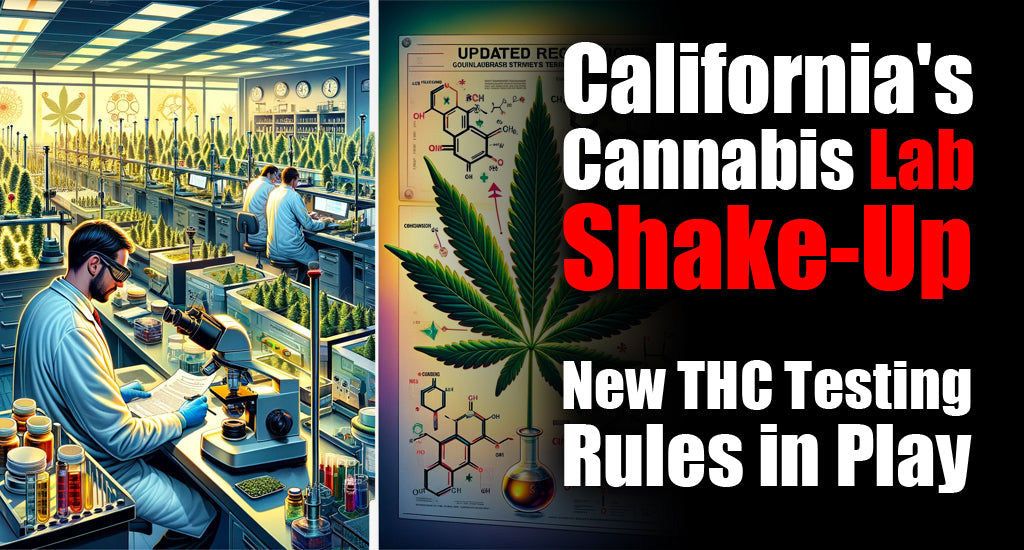
California's Cannabis Lab Shake-Up: New THC Testing Rules in Play
Recent developments in California's cannabis industry have led to significant changes in the guidelines for cannabis lab testing. The California Department of Cannabis Control (DCC) has introduced new standards, primarily to combat the issue of labeling scams related to THC potency in cannabis products. This move has profound implications for laboratories, consumers, and the industry as a whole.
The Crux of the Change
A primary driver for these new guidelines is the widespread issue of inflated THC levels in cannabis products. Previously, many labs allegedly manipulated THC potency results to enhance the market value of cannabis products. The new regulations require labs to adhere to standardized methods for THC testing, which only a limited number of labs have currently met.
As of early January 2024, only 12 out of California's 38 labs are compliant with these new requirements. Labs that fail to comply with the new standards are restricted from testing cannabis flowers and non-infused pre-rolls, which form a significant portion of the legal cannabis market.
Key changes in California's cannabis lab testing guidelines
-
Standardized THC Testing Methods: Labs are now required to use standardized methods for testing THC potency. This change aims to address the issue of potency inflation.
-
Compliance Requirement for Labs: Only labs that comply with the new standardized testing methods are permitted to test marijuana flower and non-infused pre-rolls.
-
Limited Lab Eligibility: As of early January 2024, fewer than one-third of California's 37 licensed cannabis testing laboratories are compliant and permitted to test these products.
-
Testing Restrictions for Non-Compliant Labs: Labs that have not met the new standards are restricted to testing other cannabis products like edibles, concentrates, and infused pre-rolls.
-
Verification Report Submission: Labs were required to submit a verification report by October 31, attesting their compliance with the standardized method.
-
Impact on Lab Operations: Non-compliant labs face limitations in their operations until they submit a verification report and receive approval.
-
Enforcement and Monitoring: The DCC has emphasized strict enforcement of these guidelines, including potential disciplinary actions against labs testing without certification under the new standards.
-
Market Integrity and Consumer Protection: These changes are expected to enhance market integrity and protect consumers by providing accurate information about THC content.
Implications for Laboratories and the Market
The new guidelines introduced by the California Department of Cannabis Control (DCC) have significantly reshaped the landscape for cannabis laboratories and the market at large. With the enforcement of standardized THC testing methods, only a fraction of the state's licensed cannabis testing laboratories currently meet the requirements to test marijuana flower and non-infused pre-rolls. This change reflects a pivotal shift towards ensuring accuracy and reliability in THC potency reporting, addressing long-standing concerns over inflated THC levels.
However, this transition is not without its challenges. The reduction in the number of authorized labs has the potential to create bottlenecks in the testing process, which could reverberate through the supply chain. Cannabis products, particularly those in high demand, may experience delays in reaching the market, although the DCC does not expect significant disruptions. The agency's proactive approach in working with labs to facilitate compliance suggests a commitment to minimizing these impacts.
In the short term, dispensaries might face fluctuations in the availability of certain cannabis products. This situation underscores the delicate balance between regulatory enforcement and market dynamics. Labs that have yet to comply with the new standards are focusing on other product categories, like edibles and concentrates, which remain crucial segments of the cannabis market.
The new guidelines are set to recalibrate the California cannabis industry, promoting consumer trust through more reliable product labeling. As the DCC continues to review and approve more labs, the initial hiccups in product testing and supply are expected to stabilize, paving the way for a more transparent and accountable cannabis market.
Conclusion
The introduction of these new testing guidelines marks a critical step towards ensuring transparency and accuracy in the labeling of cannabis products in California. This move is expected to help mitigate the issue of inflated THC content, thus offering consumers more reliable product information.
The DCC's effort to standardize testing protocols not only aims to protect consumers but also to maintain the integrity of California's cannabis market. The full impact of these changes will unfold over time as the industry adjusts to the new regulatory landscape.
Leave a comment
Comments will be approved before showing up.



